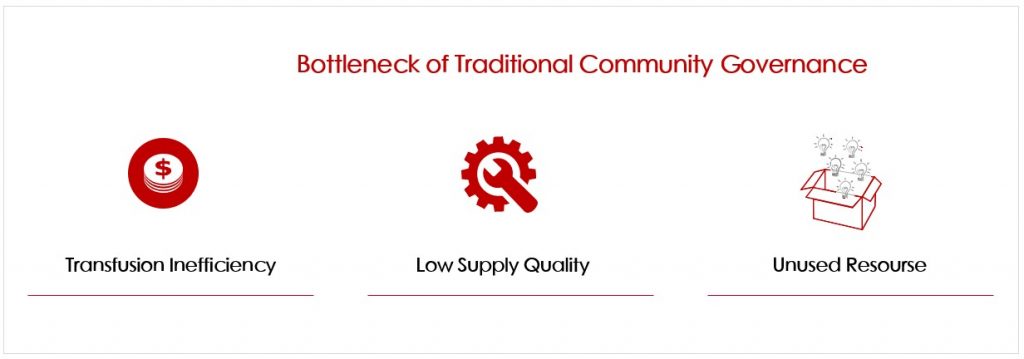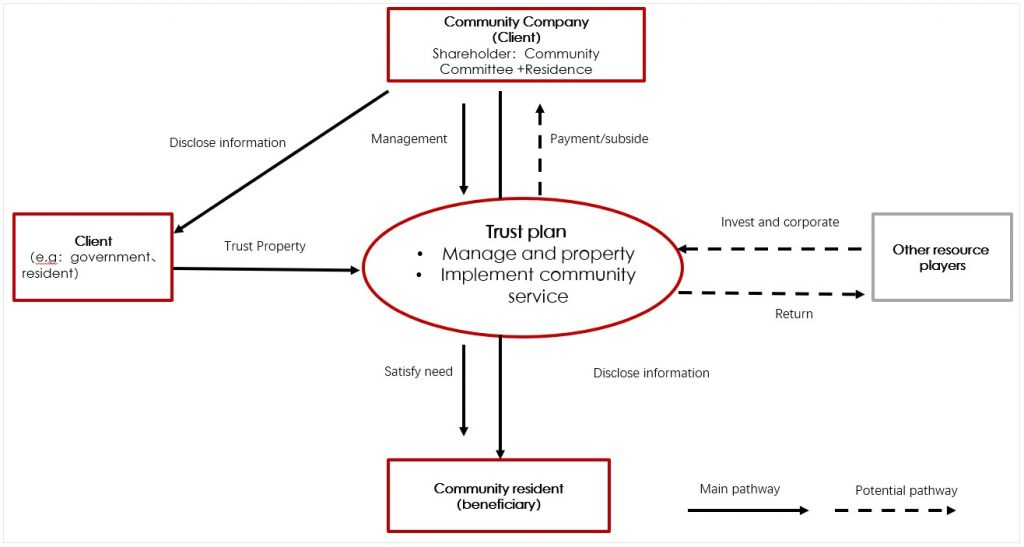VA Insight| The New Opportunities and Challenges of “Trust Model” Applied in Community Company
Establishing community company by the community residential committee is a novel way to tackle problems of community development and governance.
Given by the condition of taking fight against the COVID-19 pandemic into regular status, community as the frontline of prevention and disease control, its importance in Chinese social governance is further highlighted. How to promote community governance has become a critical issue for government and the whole society. For instance, Chengdu took the lead in exploring innovation of community governance in China. In 2017, it published “30 principles of urban and rural community developmental governance” (No.27 Paper) in which the government clearly put forward the “community development governance system” ,is“ led by the party at grass-roots level and the government at grass-roots level, features in pluralistic participation, joint governance, and mutual development”.
In practice, the traditional community service model has three disadvantages: inefficiency, low quality of service supply and idle community resource. Firstly, because the funds are mainly allocated from government budget, community needs to spend a long time to purchase services. Moreover, the purchasing process is required to repeat every year. Meanwhile,the participating organizations are not motivated to improve the quality of service. Secondly, governmental pricing projects have low attraction to commercial agencies due to its low profits but high qualification and capacity required for social organizations. Therefore, it is difficult to find suitable service providers. Finally, because the spare space and bulletin board are public goods, so the community residential committee is not allowed to lease them or run business. Moreover, there is high level of risk in management and control when they directly cooperate with commercial enterprises. Thus, these public places are often left unused .

“Community company” is an innovative solution to these disadvantages of traditional community service mode.
Firstly, as the community residential committee knows the community better, they can organize , provide, coordinate, connect and select more targeted services.
Secondly, when the community company can regularly operate and get profits, the community will have some free and allocational funds. On the one hand, this will improve the work enthusiasm of community residential committee. On the other hand, it can satisfy residents’ demands better, and provide more personalized services and activities, including provide more assistance for the vulnerable groups.
Thirdly, the “General Rules of the Civil Law ” vests a “special legal person” status to the community residential committee. Therefore, the committee can set up a community company as a market agent to revitalize community resources and create more value for community residents. Community company can guide residents to participate in solving community issues by setting up board,council and other mechanisms,so as to achieve joint governs, joint construct and joint sharing .
Lastly, community company can increase the threshold when commercial activities enter communities, and standardize management requirement. In the end, it will eliminate safety risks and improve community environment. Additionally, it provides employment opportunities as well.
Take the community case in our research community as an example. In the past, the problem of peddlers’ occupying roads was serious in this community. After the community company was set up, it unified lease management of street kiosks and convenient service stores, selected and regulated existing vendors. Therefore, the problem of unlicensed business and street occupation had been improved. Other problems such as invisible risk of food hygiene and safety, traffic safety and fire protection were also relieved. Meanwhile, community patrol teams were subsidized and more employment opportunities were created.

Compared to traditional community service, community company has certain advantages, but it has risks and challenges as well.
Firstly, community company may disturb market order. Although the staff of community residential committee are not government officials, they still represent governmental power to residents and commercial enterprises. Therefore, community company may monopolize the whole community and prevent other companies go into community because of its power and influence.
Secondly,community company is possibly abused by others for personal gain. Because the community party committee and residential committee has the power to allocate resource, there is potential for them to abuse their power to seek personal gain. At the same time, there are other problems such as difficulty in implementing internal and public supervision, high implementation cost and the solution of the problems is lagging behind. Thus, the effects of supervision and restriction should be improved.
Finally, the relevant laws and regulations of community company are not clear. Community company is in the early stage so far, giving chance for “treating special issues specially” or “special approval from superiors”, which means pilot experience cannot be applied and replicated widely. So far, how to serve community and optimize grass-roots governance by community company needs further study for grass-roots community and relevant government departments.
We put forward the concept of “trust model community company” to avoid the previous risks effectively.
In this model, the government and residents act as “clients” to entrust the community property (and some private properties if the company allows social capital to participate) to community company. In addition, the community company as the “trustee” is required to accept the entrustment, making promises to maximize community interests, and use properties for community governance with appropriate management. Finally, community residents, acting as “beneficiaries”, will not only enjoy the upgraded services and other benefits created by community companies but also will have full supervisory rights. They can ask for information and account bills of service projects. Likewise, they can require community company to explain specific problems and change measurement that are inconsistent with community’s interest. Community also can introduce reliable and professional supervisors to supervise community company and ensure the benefits of community residents.
How “trust model” ensure community company to prioritize community benefits? There are three mechanism:

Firstly, as is restricted by Trust Law, community company as trustee must maximize the community benefits, and fulfill the obligations of practicing honesty, trustworthiness, prudence and effective management. If the community company uses the property for its own benefits, these benefits will be classified the property as well.
Secondly, trust model has higher requirements for information disclosure. As a result, community company must disclose information of trust affairs and property status yearly.
Lastly, Trust Law gives residents with higher supervision rights and clear channel to safeguard legitimate rights and interests.
In conclusion, how to ensure community company’s prioritizing “community interests” is a huge challenge. Even though“Trust model” is feasible in theory, it needs to be further studied in terms of solving problems in practice. For example, whether the community has legitimate “trust property”, what kind of trust the community company belongs to, etc. We also hope to inspire qualified communities to apply “trust model” into community company, and then find out the most effective and concise standard management system. We hope to see more and more community companies transform towards having standard governance, operating well and satisfying residents so as to satisfy community residents’ need for a better life.
Typical Cases of Community Company
Chengdu X Resident Service Co., Ltd
This community company was set up in December 2001. The community has abundant resources including well-known hospitals and provincial investment groups. The community locates in urban area with a dense population. It covers 0.7 square kilometers, 43 communities (courtyards) with more than 6,300 households and 18,000 residents. The registered migrate population is more than 5000, and more than 100,000 people pass by daily.
Chengdu X Resident Service Co., Ltd. (the “parent company”) was registered in December 2017, and then Sichuan X Service Co., Ltd. (the “subsidiary company “) was set up in January 2018. The community residential committee controls parent company and indirectly controls the subsidiary company. The parent company was funded by the community residential committee, the community managers and community residents, in which, the community residential committee acting as the special legal person and holding 51.1% of the shares. The subsidiary company was funded by the parent company and other two companies. The parent company holds 57% of the shares, so the community residential committee indirectly holds 29.1%. Furthermore, community managers and director deeply engage in the governance and management of the parent company and the subsidiary company. Whereas, the community secretary acts as the supervisor of the parent company, the legal person and chairman of the subsidiary company. The community director acts as the executive director and general manager of the subsidiary company. The subsidiary company not on play the role of implementing projects to serve the residents, but also return 20% of its profits back to the community fund as agreed in the company constitution.
Since its establishment, the subsidiary company provide living services for the community through three major business: elderly health care, cultural and creative industry, and intelligent retail . It has already completed a number of projects, such as Chengdu Le Lin health care center, health management center, Xiao Bai Homecare, Urban Forest Reading Bar, Intelligent Bookstore, Hong Qi New Retail and Grandma’s Kitchen. These projects were jointly invested by the subsidiary company and third-party. In the process, it signed strategic cooperative agreements with leading enterprises to achieve integrated uses of community resources. So far, the subsidiary company have achieved balanced income and costs with a few surplus. It has returned over 100,000 yuan to community fund to implement philanthropy activities such as poverty reduction, the elderly and the disabled care, child wellbeing, and so on. In the end, there are over 5,000 individual benefit from these activities.
